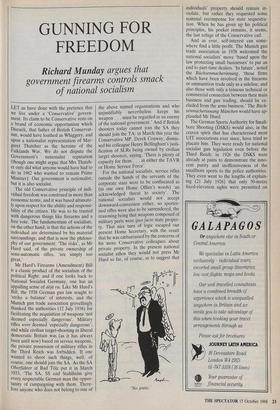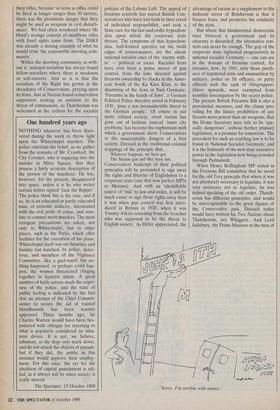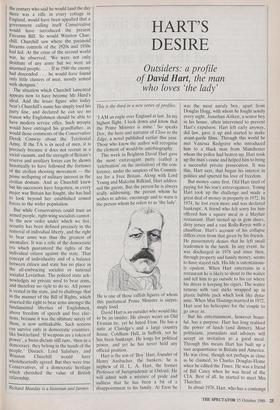GUNNING FOR FREEDOM
Richard Munday argues that
government firearms controls smack of national socialism
LET us have done with the pretence that we live under a 'Conservative' govern- ment. Its claim to be Conservative rests on a brand of economic opportunism which Disraeli, that father of British Conservat- ism, would have loathed as Whiggery, and upon a nationalist representation of Mar- garet Thatcher as the heroine of the Falklands War. We do not dispute the Government's nationalist reputation (though one might argue that Mrs Thatch- er only did what anyone would have had to do in 1982 who wanted to remain Prime Minister). Our government is nationalist; but it is also socialist.
The old Conservative principle of indi- vidual freedom was construed in more than economic terms, and it was based ultimate- ly upon respect for the ability and responsi- bility of the citizen. He was to be trusted with dangerous things like firearms and a free vote. The fundamentum of socialism, on the other hand, is that the actions of the individual are determined by his material surroundings; and that is now the philoso- phy of our government. 'The risks', as Mr Hurd said, of the private ownership of semi-automatic rifles, 'are simply too great.'
Mr Hurd's Firearms (Amendment) Bill is a classic product of the socialism of the political Right: and if one looks back to National Socialist Germany, one has an appalling sense of (kid vu. Like Mr Hurd's Bill, the 1938 German gun law sought to `strike a balance' of interests, and the Munich gun trade association grovellingly thanked the authorities (12 July 1938) for facilitating the acquisition of weapons 'not deemed especially dangerous'. Military rifles were deemed 'especially dangerous'; and while civilian target-shooting in liberal democratic Britain was (as it has always been until now) based on service weapons, the private possession of military rifles in the Third Reich was forbidden. If one wanted to shoot such things, well, of course, one should join the SA. As the SA Oberfahrer at Bad Tolz put it in March 1933, 'The SA, SS and Stahlhelm give every respectable German man the oppor- tunity of campaigning with them. There- fore anyone who does not belong to one of
the above named organisations and who unjustifiably nevertheless keeps his weapon . . . must be regarded as an enemy of the national government.' And if British shooters today cannot join the SA they should join the TA: in March this year the Conservative MP, Derek Conway, dismis- sed his colleague Henry Bellingham's justi- fication of SLRs being owned by civilian target shooters, saying, 'There is plenty of capacity for them . . . in either the TAVR or Home Service Force'.
For the national socialists, service rifles outside the hands of the servants of the corporate state were to be confiscated as (in our own Home Office's words) 'an acknowledged threat to society'. The national socialists would not accept downward-conversion either, so sporter- ised rifles were also to be surrendered, the reasoning being that weapons composed of military parts were ipso facto state proper- ty. That nice turn of logic escaped our present Home Secretary, with the result that he was embarrassed by the concerns of his more Conservative colleagues about private property. In the present national socialist ethos they would not press Mr Hurd so far, of course, as to suggest that 'No jeans.' individuals' property should remain in- violate, but rather they requested some nominal recompense for state sequestra- tion. When he has given up his political principles, his pocket remains, it seems, the last refuge of the Conservative cad.
And as ever, self-interest can some- where find a little profit. The Munich gun trade association in 1938 welcomed the national socialists' move 'based upon the law protecting small businesses' to put an end to part-time dealers. 'In future', noted the BUchsenmacherinnung, 'those firms which have been involved in the firearms or ammunition trade only as a sideline, and also those with only a tenuous technical or commercial connection between their main business and gun trading, should be ex- cluded from the arms business.' The Biich- senmacherinnung Mfinchen would have ap- plauded Mr Hurd.
The German Sports Authority for Small- bore Shooting (DSKS) would also, in the craven spirit that has characterised most UIT associations ever since, have tried to placate him. They were ready for national socialist gun legislation even before the Third Reich: in 1926 the DSKS were already at pains to demonstrate the inno- cent purity and inoffensiveness of the smallbore sports to the police authorities. They even went to the lengths of explain- ing (21 July 1926) that only 50-metre fixed-elevation sights were permitted on their rifles, because 'as soon as rifles could be fired at longer ranges than 50 metres, there was the proximate danger that they might be used as weapons in civil disturb- ances'. We had often wondered where Mr Hurd's strange concept of smallbore rifles with fixed sights came from. The DSKS was already a shining example of what he would term 'the responsible shooting com- munity'.
Within the shooting community as with- out it, national socialism has always found fellow-travellers where there is weakness or self-interest. And so it is that the socialism of the Right has grown in the decadence of Conservatism, preying upon its fears. Just as Nazism found conservative supporters seeking an antidote to the threat of communism, so Thatcherism was welcomed as the redress for the socialist
policies of the Labour Left. The appeal of firearms controls has snared British Con- servatives who have lost faith in their creed of individual responsibility, and seek a State cure for the law-and-order hypochon- dria upon which the corporate state thrives. The symptoms of that hypochon- dria, half-formed spectres on the twilit edges of consciousness, are the classic national socialist ones of the 'enemy with- in' — political or racial. Racialist fears have ever been a prime mover of gun control, from the laws directed against firearms ownership by blacks in the Amer- ican South of the Ku Klux Klan, to the disarming of the Jews in Nazi Germany. 'Firearms in the hands of Jews', a German Political Police directive noted in February 1936, 'pose a not inconsiderable threat to the German people.' Of course in our more refined society, overt racism has gone out of fashion: instead 'inner city problems' has become the euphemism with which a government alerts Conservatives to the unacceptable dangers of a free society. Dressed in the traditional colonial trappings of the principle that,
Whatever happens, we have got The Maxim gun and they have not, Conservatives bankrupt of their political principles will be persuaded to sign away the rights and liberties of Englishmen to a corporate state (one that now prefers MP5s to Maxims). And with an 'identifiable source of 'risk' to law-and-order, it will be much easier to sign those rights away than it was when gun control was first intro- duced in Britain in 1920, when it was Tommy Atkins returning from the trenches who was supposed to be the threat to English society. As Hitler appreciated, the advantage of racism as a supplement to the inchoate terror of Bolshevism is that it focuses fears, and promotes the solidarity of the state.
But where that fundamental democratic trust between a government and its citizenry is discarded, the alternative con- trols can never be enough. The grip of the corporate state tightened progressively in national socialist Germany — one can see in the domain of firearms control, for instance, how, by 1941, only those purch- ases of registered arms and ammunition by military, police or SS officers, or party officials with the rank of Ortsgruppen- fiihrer upwards, were exempted from monthly investigation by the secret police. The present British Firearms Bill is also a provisional measure; and the clause pro- viding for the future prohibition of any firearm more potent than air weapons, that the Home Secretary may rule to be 'spe- cially dangerous', without further primary legislation, is a promise for tomorrow. The precedent for such an enabling law is to be found in National Socialist Germany; and it is the hallmark of the new state executive power in the legislation now being crowded through Parliament.
When Henry Bellingham MP stated in the Firearms Bill committee that he stood for the old Tory principle that where it was not absolutely necessary to legislate, it was very necessary not to legislate, he was indeed speaking of the old order. Thatch- erism has different principles, and would be unrecognisable to the great figures of the Conservative past. Disraeli today would have written his Two Nations about Thatcherism, not Whiggery. And Lord Salisbury, the Prime Minister at the turn of 'Sorry, I'm terrible with names.' the century who said he would laud the day there was a rifle in every cottage in England, would have been appalled that a government calling itself Conservative would have introduced the present Firearms Bill, So would Winston Chur- chill. Churchill saw where the paranoid firearms controls of the 1920s and 1930s had led. At the crisis of the second world war, he observed, 'We were not only destitute of any army but we were an unarmed people. . . . If in 1940 the enemy had descended . . he would have found only little clusters of men, mostly armed with shotguns.'
The situation which Churchill lamented appears now to have become Mr Hurd's ideal. And the lesser figure who today bear's Churchill's name has simply toed his party line, and declared he can see no reason why Englishmen should be able to have modern service rifles. Such myopia would have outraged his grandfather, as would those comments of the Conservative Derek Conway about the Territorial Army. If the TA is in need of men, it is precisely because it does not recruit in a social vacuum, and the strength of Britain's reserve and auxiliary forces can be shown historically to have followed the fortunes of the civilian shooting movement — the prime wellspring of military interest in the civilian domain. And as Churchill knew but his successors have forgotten, in every major war Britain has fought, she has had to look beyond her established armed forces to the wider population.
But while Conservatives could trust an armed people, right-wing socialists cannot. In the new order under which we live, security has been defined precisely in the removal of individual liberty, and the right to bear arms was thus the greatest of anomalies. It was a relic of the democratic era which guaranteed the rights of the Individual citizen against the state. That concept of individuality and of a balance between citizen and state has no place in the all-embracing socialist or national socialist Leviathan. The policed state ack- nowledges no private need to bear arms, and therefore no right to do so. All power is vested in the state, and to challenge that In 'the manner of the Bill of Rights, which asserted the right to bear arms amongst the fundamental liberties of Englishmen, above freedom of speech and free elec- tions, because it was the ultimate surety of them, is, now unthinkable. Such notions can survive only in democratic countries, like Switierland. 'If weapons are a token of power', a Swiss dictum still runs, 'then in a democracy, they belong in the hands of the people.' Disraeli, Lord Salisbury, and
Winston Churchill would have wholeheartedly agreed. But they were true Conservatives, of a democratic heritage which cherished the value of British citizenship.
Richard Munday is a historian and farmer.




























































 Previous page
Previous page